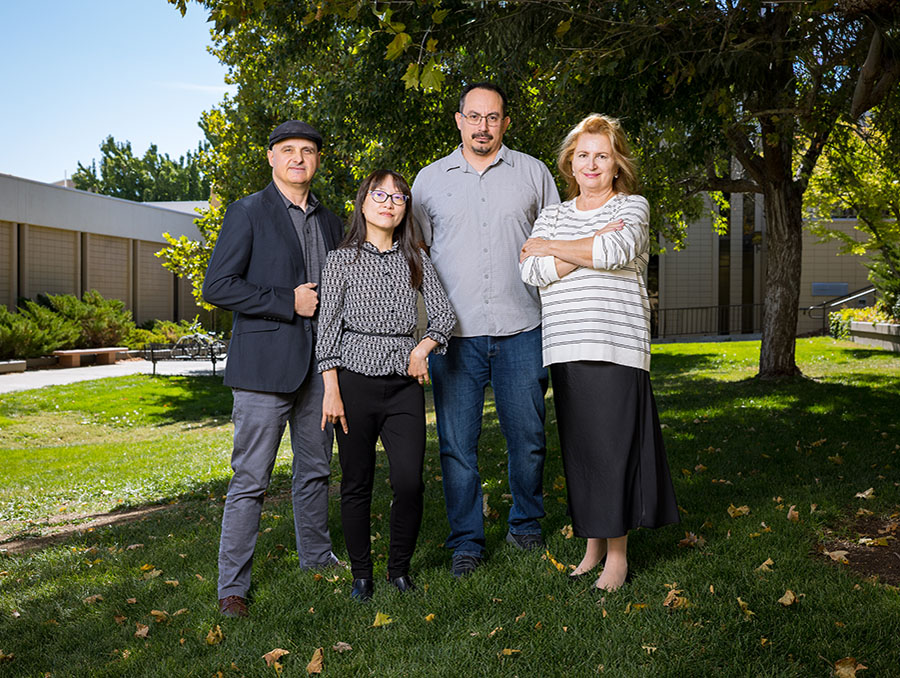The University of Nevada, Reno School of Medicine (UNR Med) is celebrating a major milestone in research achievement: four of its faculty members in the Department of Physiology and Cell Biology have been awarded competitive grants from the National Institutes of Health (NIH), totaling more than $8.9 million in federal research support. Their projects span critical areas of health science, from understanding gastrointestinal function and bladder complications in diabetes, to uncovering how the brain regulates blood flow in health and disease.
These awards highlight not only the caliber of UNR Med’s research enterprise but also the indispensable role of NIH funding in fueling scientific discovery across the nation.
“The success in securing these highly competitive NIH RO1 awards highlight the strength and innovation of our research programs as well as the dedication and perseverance of the faculty in the Department of Physiology and Cell Biology,” said Dean Burkin, Ph.D., interim chair of the department.
Advancing digestive health: Sal Baker, Ph.D.
Sal Baker, Ph.D., associate professor, has been awarded $2.6 million over four years from the NIH’s National Institute of Diabetes and Digestive and Kidney Diseases to study how hormones and natural brain chemicals regulate intestinal movement. His research focuses on two types of specialized cells in the gut that act like “pacemakers” and “signal conductors,” controlling how food moves through the digestive system. By learning how hormones such as secretin, GLP-2 and CGRP interact with these cells, Baker’s work could lead to new ways of diagnosing and treating digestive disorders that affect millions of people.
Addressing diabetic bladder dysfunction: Violeta Mutafova-Yambolieva, M.D., Ph.D.
Alfred Hitchcock once quipped, “The length of a film should be directly related to the endurance of the human bladder.” With his signature wit, he captured not only the art of cinematic pacing and audience engagement, but also — perhaps unintentionally — the critical importance of bladder health in preserving comfort and quality of life.
Bladder problems are a hidden but common complication of diabetes, affecting up to 80% of patients. To tackle this issue, Violeta Mutafova-Yambolieva, M.D., Ph.D., vice chair of the Department of Physiology and Cell Biology, has received $926,000 over three years from the NIH’s National Institute of Diabetes and Digestive and Kidney Diseases. Her research looks at the bladder in a new way — focusing on the bladder lining, rather than just nerves and muscles. Her team studies chemical messengers called purines, which may become unbalanced in diabetes and disrupt normal bladder function. By uncovering these processes, Dr. Mutafova-Yambolieva's work could lead to better treatments for bladder complications that currently have few effective options.
“Funding for research is a crucial ally in our quest for knowledge,” Mutafova-Yambolieva said. “It not only enables access to vital resources, but also opens doors to advanced technologies, specialized equipment, and meaningful collaborations. Yet in today’s highly competitive landscape, obtaining such support is increasingly challenging. That’s why I’m deeply grateful for this award — it empowers us to continue pushing the boundaries of our work and advancing our mission.”
Unraveling brain blood flow and Alzheimer’s disease: Cam Ha Thai Tran, Ph.D.
The brain depends on a constant supply of oxygen and nutrients, delivered by blood flow that adjusts based on which areas are most active. Cam Ha Thai Tran, Ph.D., associate professor, has been awarded $2.8 million over four years from the NIH’s National Institute of Neurological Disorders and Stroke to study how norepinephrine helps regulate this blood flow. Norepinephrine is essential for attention and alertness, but the cells that produce it are often among the first to degenerate in patients with Alzheimer’s disease. Tran’s research will investigate how the loss of these cells may disrupt blood flow in the brain and contribute to disease progression. The findings could lead to new strategies for detecting and treating neurological disorders such as Alzheimer’s.
Fine-tuning capillary blood flow: Albert Gonzales, Ph.D.
Albert Gonzales, Ph.D., assistant professor, has been awarded $2.6 million over four years from the NIH’s National Heart, Lung, and Blood Institute to study tiny cells called pericytes that wrap around capillaries, the smallest blood vessels in the brain. His research focuses on a subtype known as thin-stranded pericytes, which may act like sensors — detecting changes in pressure and nerve signals to help regulate blood flow. Using advanced imaging techniques, his team is investigating how these cells fine-tune oxygen delivery at the capillary level. Understanding these processes could shed light on how the brain manages its energy supply and informs new therapies for neurological conditions.
“Investigating these novel cellular roles highlights how fundamental research expands our understanding of biology and lays the groundwork for future breakthroughs in health and disease,” Gonzales said.
The importance of NIH funding
Together, these four projects exemplify how NIH-funded research drives progress in areas that directly affect human health. Since its founding in 1887, the NIH has been the cornerstone of American medical progress. Today, more than 80% of its budget supports researchers at universities and institutions across the country, including UNR Med.
The stakes are high – a recent Congressional Budget Office report found that even a 10% permanent cut to NIH funding could result in 20 fewer new drugs reaching the market by 2045. Yet public support remains strong — 77% of Americans oppose cuts to federal medical research according to a Washington Post-ABC News-Ipsos Poll, and 85% agree that the U.S. must remain a global leader in science and technology.
“These awards recognize our faculty’s expertise and national standing in their respective fields," Lucia Notterpek, Ph.D. said.
“These NIH-funded projects exemplify how research at UNR Med is generating critical new knowledge about the biological processes that drive the functioning of major organ systems in both health and disease,” said Lucia Notterpek, Ph.D., senior associate dean of research. “These awards recognize our faculty’s expertise and national standing in their respective fields — and they are certainly deserving of congratulations!”
For UNR Med, the success of researchers underscores the school’s growing research impact and its commitment to improving health outcomes in Nevada and beyond.
















